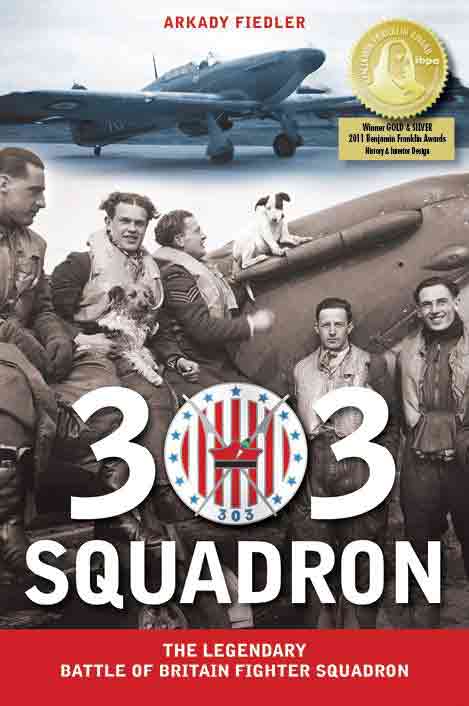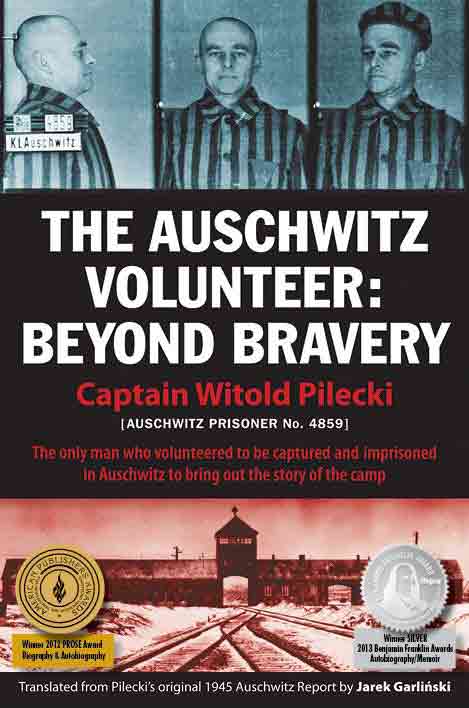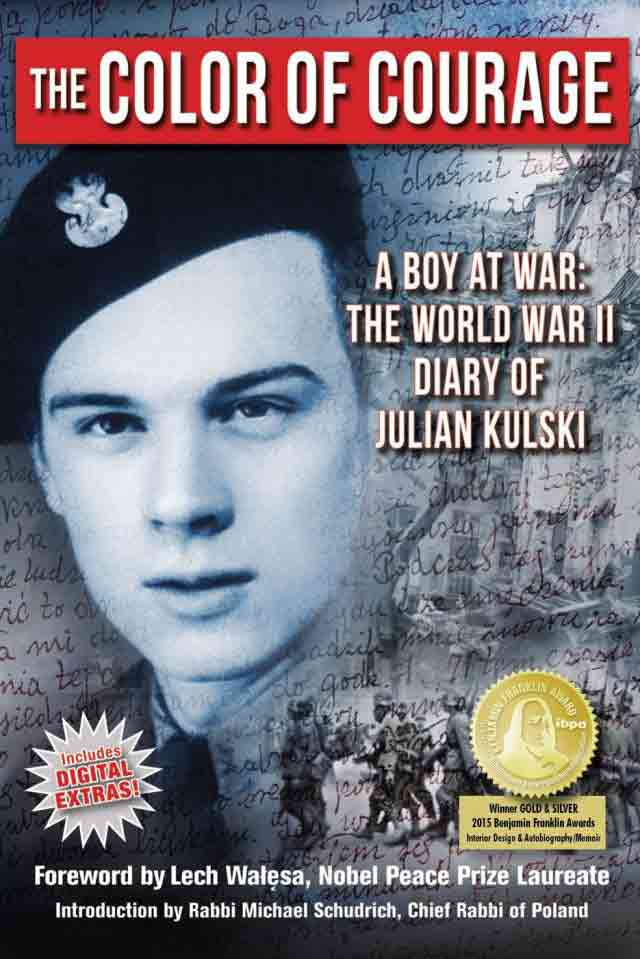Terry Tegnazian is among a growing number of Americans with no Polish roots who notice that there is a big piece of education missing in their upbringing. It is the history of Poland and the role she played in World War II. In 2005, Terry opened a new publishing house Aquila Polonica Publishing with the mission to bring the story of Poland and Poles in World War II and after to the American public. The quality of Aquila Polonica work has been recognized through several prestigious awards and a growing readership.

Terry Tegnazian
Meticulous effort to present this part of history to the American mainstream is enhanced by adapting the content and presentation to the expectations of a demanding American audience. A reader is pleasantly surprised by updated translations of dated material and the content expanded by proprietary video illustrations, which can be activated by scanning QR codes in text, or by an addendum to a book. Some publications can easily be used as college or high school textbooks. They are enhanced with methodologically appropriate questions for discussions and assignments for tests or term papers.
The additional value of Aquila Polonica is that the owner and the CEO is not a Polish American, thus emotionally connected to the subject by a family history. A Yale-educated attorney with experience in the financing of movie industry, Terry Tegnazian decided that publishing relevant material about Poland’s role in World War II made business sense. Coming to the story of Poland in World War II without any preconceived notions, she was the right person to present the material for an average American reader. With an impressive track record of growth, Aquila Polonica is proof of how relevant, and appealing the information on the role of Poland in World War II and beyond is for those who want to better understand the increasingly complicated and confusing presentation of the global landscape.
It all began when Terry planned to write a book about the pilots of World War II and decided that one of the characters would be a Polish fighter pilot in the Battle of Britain (which took place from July 10, 1940 to October 31, 1940). The more she researched the subject to create a genuine portrait of her character, the more fascinated she became with the story of Polish pilots in England and the Polish fight against the aggressors, both Germans and Russians. Terry’s research far exceeded the background check for one fictional character in a novel. The more Terry read and interacted with witnesses, the more she was convinced that an American audience would love in-depth information on Poland’s role in World War II.
Terry realized that citing original sources was not enough to present the facts clearly and unambiguously in the United States, where the public lacks general information regarding Poland. The Polish WWII experience was so entangled with all aspects of German, Russian, British, French, and American interests that one needed background information to understand what really happened without bias. The narrative presented for American audience has been stunted by a strong Russian influence and manipulation during WWII and after. Aquila Polonica often adds helpful basic background information in its materials so that an average American is not simply confused by the new facts, which often contrast with scanty knowledge presented in the U.S.
During one of the interviews Terry said: “I knew only about the Holocaust and was missing all the rest of Poland’s experience and role as one of our Allies in WWII. I realized that the communists controlled the post-war narrative and decided to marginalize and discredit the Poles. We deserve to know the full story of Poland and Poles who were our allies from the first to the last days of the war. Under the harshest occupation, Poles ran the largest underground resistance network in Europe which provided military intelligence to the Allies, including information about the Holocaust.”
The average life of Polish underground fighters could be measured in months, but they never lacked for volunteers. For the majority, honor and integrity were the values that motivated them in their fight together with the love for their country and of the freedom. The WWII generation of Polish fighters had a tremendous value system, which sustained their effort despite the odds. Through 50 years of fighting and hardship, Poles finally regained their independence in 1989. It was two generations of sustained effort, which brought tangible results.
Three books, as the illustration of Aquilla Polonica offering:
303 Squadron: The Legendary Battle of Britain Fighter Squadron (2010)

Written by Arkady Fiedler and translated by Jarek Garliński. The original 1942 edition, which Fiedler wrote during the Battle of Britain, used pseudonyms for the Polish fighter pilots because their families were still in Poland under German occupation. The new Aquila Polonica translation discloses the names of Polish pilots in English for the first time. This book won the Gold Award for History and Silver Award for Interior Design at the 2011 Benjamin Franklin Awards of the Independent Book Publishers Association and was excerpted in Smithsonian’s Air and Space Magazine.
The story of 303 Squadron is an amazing one—it was the highest-scoring Allied fighter squadron in the Battle of Britain. These Polish fighter pilots shot down three times the number of enemy planes with only one-third the casualties of the average RAF squadron. And in September 1940, they shot down more than twice the number of enemy planes as compared to the next highest-scoring RAF squadron, which was British one (108 for 303 Squadron vs. 48 for the British squadron).
The Auschwitz Volunteer: Beyond Bravery (2012)

Translated by Jarek Garliński from the original 1945 Witold Pilecki report held at the Polish Underground Movement Study Trust in London. This was Pilecki’s third, and most comprehensive, report written for his Polish Army superiors about his secret undercover mission at Auschwitz. In 1943, after his escape from Auschwitz, Witold Pilecki wrote his first initial eleven-and-a-half-page report while staying with the Serafiński family in Nowy Wiśnicz. This was the first location where Pilecki stayed after a continuous harrowing seven-day run from Auschwitz, during which he crossed the border between Germany and the territory of German-occupied Poland called the Generalgouvernement.
Konzentrationslager (KL) Auschwitz was created on territory that was formerly Poland but had been incorporated into the German Reich as Eingegliederte Ostgebiete by Hitler’s decree of October 1939. The nucleus of this German concentration camp was a group of army barracks in the town of Oświęcim, from which it grew enormously. Pilecki’s second report of around 20 or so pages was written in late 1943 while in Warsaw, where he fought in the 1944 Warsaw Uprising, before being taken prisoner by the Germans. His third most comprehensive report of more than 100 single-spaced typed pages was written in the summer of 1945 in Italy, where Pilecki served with Polish Second Corps after liberation. Following completion of the third report, Pilecki volunteered yet for another secret mission into Russian-occupied Poland. This mission ended when Pilecki was captured, tortured, and killed by the Polish communist government security apparatus in 1947.
The book got great reviews in major media such as The New York Times (where it was an Editors’ Choice), The Wall Street Journal (one of the Five Best Books on wartime secret missions), The Atlantic, etc. It won the 2012 PROSE Award for Biography and Autobiography from the Association of American Publishers and the Silver Award for Autobiography/Memoir at the 2013 Benjamin Franklin Awards. It’s also been translated and published in seven foreign languages—the Japanese-language edition is the most recent publication, the rights for which were acquired from Aquila Polonica by Misuzu Shobo Publishers in Tokyo (see Kuryer article of 9 April 2021).
The Color of Courage—A Boy at War: The World War II Diary of Julian Kulski (2014)

This memoir was written in 1945 under the advice of a doctor who was treating 16-year-old Polish Army veteran Julian Kulski for severe post-traumatic stress disorder (PTSD), after his daring escape from the German POW camp Stalag XI-A Altengrabow onto an American truck in May 1945. It has an introduction by the Chief Rabbi of Poland, and a foreword by Nobel Peace Prize Laureate Lech Wałęsa.
Julian Eugeniusz Kulski describes his life during WWII from age ten to the age of sixteen. As Julian was growing from a young Boy Scout to a teenage commando in the 1944 Warsaw Uprising, his father Julian Spitosław Kulski served in the precarious position of the Polish mayor of German-occupied Warsaw. As the prewar deputy mayor, Kulski took over after Mayor Stefan Bronisław Starzyński was imprisoned by the Germans in October 1939 (and eventually killed in December 1939). Both Mayor Starzyński and Mayor Kulski refused to escape with the Polish government and decided to stay in Warsaw regardless of the odds. This book also won awards. It has been translated into Portuguese and came out in Brazil under the title A Cor da Coragem. A Guerra de um Menino: O Diario de Julian Kulski na Segunda Guerra Mundial (Editora Valentina, 2016).
In The Color of Courage, Aquila Polonica included proprietary historical videos, which can be viewed on a cell phone by scanning QR codes from the book, or by typing the URL codes that appear under each image. This is a way to enhance the information and appeal to the users of newest technologies. Aquila Polonica invests as much effort in researching and licensing rights for the rare photographs and films, as in the editing process.
In Conclusion…
Terry Tegnazian said that “as an educated American, I did not know anything about Poland and the Polish fight during WWII. I had no idea that there was a Polish resistance and a Home Army following orders from Polish government located in London. The Polish Underground State was a whole sophisticated system, which included education and courts as well as the military. The Poles never gave up.”
Stalin worked hard to suppress knowledge about Poland, and his influence reached as far as American universities and the US education system. Stalin’s influence lasts until today. The story of Poland’s fight must be told. Poland fielded the fourth-largest Allied military force in the European Theater of the war, after the US, England, and Russia, but far ahead of France—and for the most critical year of the war (from June 1940 when France surrendered, to June 1941 when Hitler attacked Russia) Poland was Britain’s largest ally. Poles fought on all fronts in Europe, Asia, and Africa. Poland was the only Ally attacked and occupied by two enemies, Germans from the west and Russians from the east. Both promptly killed Polish elites, and - in addition - the Russians deported over one million Poles to Siberia. Poland needs to take her rightful place as one of key contributors to the Allied victory in WWII.
In an op-ed article published in the Wall Street Journal Europe on June 1, 2010, Terry writes:
I am an American of Armenian descent who doesn't speak or read Polish. But I am convinced that this history needs to be told to the world. It restores a missing piece of World War II, one of the most transformative events in modern history. It honors real-life heroism in the face of evil. Modern Western societies could do worse than study this example.
It is also a matter of justice and recognition. It is the pride in our history that makes us secure in our identity as a people. For too long Poles, both in Poland and in the diaspora, were denied that basic right.
We should not only read Aquila Polonica publications but also make every effort to make these books available for every American student in colleges and high schools. The lack of basic knowledge about Poland’s active role as one of the Western Allies during WWII results in an ever-increasing number of American media and politicians embarrassing themselves by distorting historical facts. Without the knowledge of basic facts, they often follow pressure and manipulations of those who want to benefit from putting Poland in an undeservedly bad light. It is our duty to bear witness so that no one will blame us for being silent in the face of lies and innuendos.
Purchasing Aquila Polonica books for high school and university libraries is an easy way to contribute to the dissemination of missing knowledge. Since Aquila Polonica did the hard job of publishing the books, disseminating them to students and our friends is an easy and effective way to do our part. The easiest way to access Aquila Polonica resources is to visit their web page at https://www.polandww2.com/. The Polish Culture Ministry should systematically invest in the distribution of these books in the United States and around the world.



